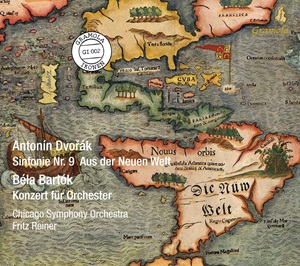
Antonín Dvořák (1841-1904)
Symphony No 9 (1893)
Béla Bartók (1881-1945)
Concerto for Orchestra (1943, rev. 1945)
Chicago Symphony Orchestra/Fritz Reiner
rec. October 1955 (Bartók), November 1957 (Dvořák), Orchestra Hall, Chicago
Gramola 92002 [77]
These are both revered recordings of works which seem rather unconnected, though do at least share in being written for an American audience. Beyond that, I don’t find this coupling as sensible or engaging as RCA’s own, but if you are interested specifically in the recordings of these two works, this is clearly a valid option.
As they are, these are reference recordings for a reason; artistically, they are exceptionally well executed, played with brilliant virtuosity by the Chicago Symphony Orchestra, and musically sensible, no-nonsense readings. Reiner knew Bartók and was instrumental in getting him the commission that led to the Concerto for Orchestra, so there is also an element of idiomatic understanding that makes this historically important, too.
I don’t find the Dvořák as immediately effective as the Bartók. Though it is hard to fault the execution and playing, it lacks some of the Romantic, spirited quality that you find in the best recordings. For Václav Talich and the Czech Philharmonic Orchestra, for example, the more traditionally Czech timbre of the woodwind and brass lends bite and authenticity. Talich opts for a freer approach, less strictly controlled, but still with exceptional excitement in the finale and a gentle songfulness in the Adagio which is immensely affecting. Reiner is by no means inadequate; it is a great recording, but his approach is more detached, more clear-eyed—which some might like—but in avoiding any sentimentality loses some of the work’s inherent personality.
The Bartók benefits more from Reiner’s style of playing; consequently, I find it more characterful and engaging. The record has always been impressive for the virtuosity of the Chicago Symphony and it is no less admirable today, though it has now been equalled many a time. There is still a sense of colour and drama here that makes it unique, and though there are other versions that are equally successful – Fricsay on DG and Kocsis on Hungaroton for instance – this one remains a prime recommendation.
Apart from the beautifully-executed performances, these recordings were and are famous for their sonics, which have aged exceptionally well. In the case of the Bartók, this is a huge advantage, given the complex orchestration. There is plenty of detail, with a wide but not over-wide dynamic range. Balances are excellent and bass and treble sharp and clear. The Kocsis on Hungaroton sounds even better, but for a recording made in 1955 there can really be no qualms about the sound on this release. The Dvořák, too, sounds wonderful, though the recording quality is not quite as beneficial for this work and I would still prefer the older Talich record despite the mono sound.
All in all, we have a re-release of two great performances, one slightly greater than the other, in exceptional sound. The main problem is that they are available separately but with more fitting couplings on RCA. However, if you are just looking for Reiner’s Concerto for Orchestra and Dvořák Ninth, then you are in luck.
Morgan Burroughs
Buying this recording via a link below generates revenue for MWI and helps us keep free access to the site


















